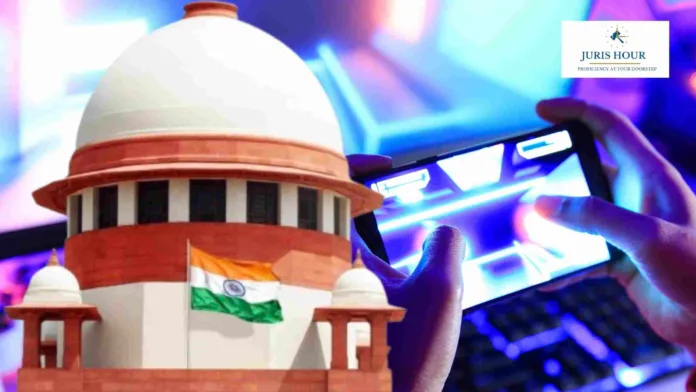On Monday, the Supreme Court of India allowed the Central government’s petition seeking the transfer of multiple challenges to the constitutional validity of the Promotion and Regulation of Online Gaming Act, 2025, pending before various High Courts. The matter, titled Union of India vs Head Digital, now stands consolidated before the apex court.
Solicitor General Tushar Mehta, representing the Central government, urged the Court to transfer the petitions pending before the Delhi, Karnataka, and Madhya Pradesh High Courts, arguing that a single hearing at the Supreme Court would save time and avoid conflicting judgments. Mehta emphasized that the challenges all revolved around the same central legislation and involved significant constitutional issues.
Senior Advocate C Aryama Sundaram, appearing for the gaming companies that had challenged the Act, welcomed the move. “We will be very happy if we get finality if the Court hears it,” Sundaram submitted, urging the Court for immediate transfer rather than interim relief.
The Bench comprising Justices JB Pardiwala and KV Viswanathan allowed the transfer petition, ordering the respective High Courts to digitally transmit the entire case records within a week. The Court instructed its registry to list the matter for early hearing after receiving the records. It also allowed the parties to file the writ petitions directly with the Supreme Court registry, along with the complete records.
The Online Gaming Act, which came into force on August 22, marks the first comprehensive central legislation prohibiting online games played for stakes across India. The law makes offering or participating in such games—whether classified as skill-based or chance-based—cognizable and non-bailable offences, signaling a major shift in the regulatory framework previously governed by disparate state laws and judicial interpretations distinguishing skill from chance games.
Following the Act’s notification, multiple constitutional challenges were filed before various High Courts. Petitioners include online gaming platforms such as Head Digital and other operators, who argue that the law infringes upon fundamental rights guaranteed under Articles 14 (Right to Equality) and 19(1)(g) (Right to Practice Profession or Business).
In its plea, the Union government asserted several reasons in favor of transfer:
- Multiplicity of Proceedings: The same legal questions are being examined by different High Courts, creating a risk of conflicting judgments.
- Uniformity and Certainty: A consolidated hearing at the Supreme Court would ensure a consistent judicial approach.
- Constitutional Importance: The case raises critical constitutional questions, including the federal division of powers and the equal treatment of skill and chance-based games.
- Speedy Justice: Consolidation would avoid procedural delays and ensure expeditious resolution.
The Union government had also requested an ad-interim stay on High Court proceedings pending the Supreme Court’s decision on the transfer.
Read More: Supreme Court Hears Plea Challenging Illegal Organ Transplant Practices

